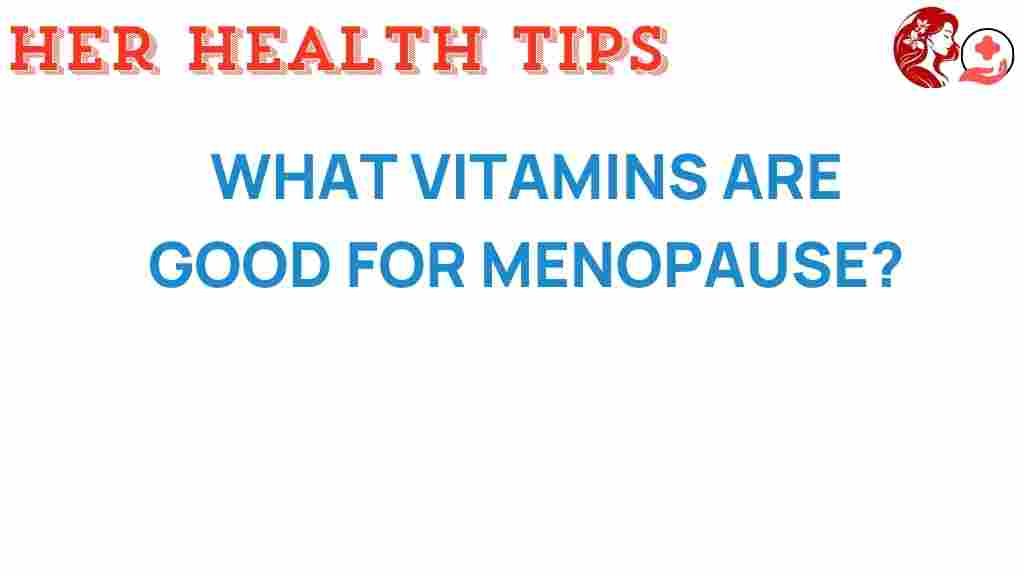Unlocking the Secrets: What Vitamins Are Vital for Menopause?
Menopause is a significant transition in a woman’s life, marking the end of her reproductive years. This natural biological process can bring about various physical and emotional changes that can affect overall health and well-being. As women navigate this phase, understanding the role of vitamins and nutrition becomes crucial for promoting women’s wellness and hormone balance. In this article, we’ll explore the vital vitamins for menopause, how they contribute to health, and practical tips for incorporating them into your lifestyle.
The Importance of Vitamins During Menopause
During menopause, hormonal fluctuations can lead to symptoms such as hot flashes, mood swings, and fatigue. Proper nutrition and specific vitamins can help alleviate these symptoms and support overall health. Here’s a closer look at why vitamins are essential during menopause:
- Supports hormone balance: Certain vitamins can help stabilize hormone levels, minimizing the impact of menopause symptoms.
- Enhances bone health: Women are at a higher risk of osteoporosis post-menopause, making bone-supporting vitamins vital.
- Boosts mood: Some vitamins can help improve mood and reduce anxiety, contributing to emotional well-being.
- Promotes heart health: Menopause increases the risk of heart disease, and certain vitamins can support cardiovascular health.
Key Vitamins for Menopause
Understanding which vitamins are vital for menopause can empower women to make informed choices about their health. Here are some of the most important vitamins to consider:
1. Vitamin D
Vitamin D plays a crucial role in calcium absorption, which is essential for maintaining bone density. During menopause, women experience a decrease in estrogen, which can lead to bone loss.
- Sources: Sunlight exposure, fatty fish, fortified dairy products, and supplements.
- Recommended intake: 600–800 IU per day, depending on age and health status.
2. Calcium
While not a vitamin, calcium is vital for bone health, especially for postmenopausal women who are at risk for osteoporosis.
- Sources: Dairy products, leafy greens, almonds, and fortified foods.
- Recommended intake: 1,200 mg per day for women over 50.
3. Vitamin B6
Vitamin B6 is essential for mood regulation and can help alleviate mood swings and irritability during menopause.
- Sources: Fish, poultry, potatoes, and non-citrus fruits.
- Recommended intake: 1.5 mg per day.
4. Vitamin E
Vitamin E is known for its antioxidant properties and can help reduce hot flashes and improve skin health.
- Sources: Nuts, seeds, spinach, and broccoli.
- Recommended intake: 15 mg per day.
5. Omega-3 Fatty Acids
Omega-3s are beneficial for heart health and can also help reduce depression and anxiety during menopause.
- Sources: Fatty fish, flaxseeds, chia seeds, and walnuts.
- Recommended intake: 1,000 mg to 2,000 mg per day.
Incorporating Vitamins into Your Diet
Now that we’ve identified the key vitamins, let’s discuss how to incorporate them into your daily nutrition effectively:
- Eat a balanced diet: Focus on whole, nutrient-dense foods that provide a variety of vitamins and minerals.
- Consider supplements: If you struggle to get enough vitamins through food, discuss supplementation with your healthcare provider.
- Stay hydrated: Drink plenty of water to support overall health and well-being.
- Plan meals: Meal prepping can help ensure you’re consistently consuming the vitamins you need.
Step-by-Step Process to Optimize Vitamin Intake
Here’s a simple process to help you optimize your vitamin intake during menopause:
- Assess your diet: Keep a food diary for a week to identify any gaps in your vitamin intake.
- Consult a healthcare professional: Speak with your doctor or a nutritionist about your dietary needs and consider blood tests if necessary.
- Choose high-quality supplements: If needed, select reputable brands that meet your vitamin requirements.
- Incorporate more fruits and vegetables: Aim for at least five servings of fruits and vegetables daily, focusing on those rich in essential vitamins.
- Monitor your symptoms: Keep track of how your body responds to dietary changes and adjust as necessary.
Troubleshooting Common Issues
As you embark on this journey to better health during menopause, you may encounter some challenges. Here are some troubleshooting tips:
- Difficulty swallowing pills: If you find it hard to take supplements, look for chewable or liquid forms.
- Food intolerances: If you have food allergies or intolerances, consult with a nutritionist to find suitable substitutes.
- Cost concerns: Focus on whole foods that are budget-friendly, such as beans, lentils, and seasonal produce.
- Lack of motivation: Find a support group or community to help motivate you on your wellness journey.
Conclusion
Menopause is a natural transition, but it can come with challenges that affect women’s wellness and overall health. By understanding the vital role of vitamins and nutrition, women can take proactive steps to support hormone balance and enhance their well-being during this phase of life. Remember, a balanced diet rich in essential vitamins, combined with lifestyle changes, can lead to a healthier, more fulfilling experience during menopause.
For more information on women’s health and wellness, check out this resource. And if you’re looking for quality supplements, consider visiting this website to explore options that suit your needs.
This article is in the category Reproductive and created by HerHealthTips Team
